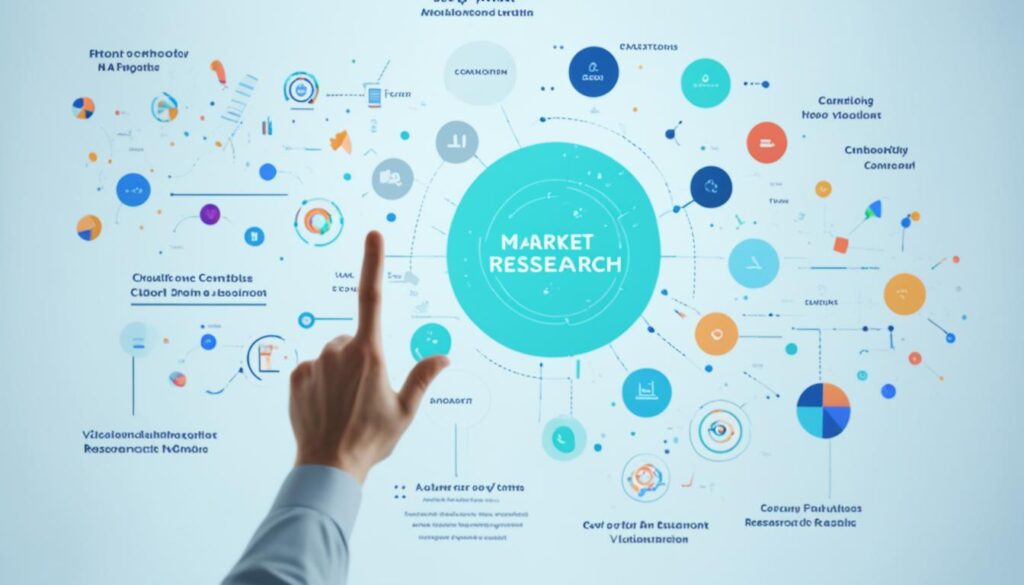“The best way to predict the future is to create it.” – Peter Drucker. This idea is very important in our digital world. It is even more true with AI market research for small and medium businesses. A 2023 Deloitte and Stanford University survey found that 25% of small businesses use AI. They use it for things like predicting trends and talking to customers through chatbots, showing a big jump in AI use.
AI gives small and medium businesses great tools. These tools help them stay strong even when the economy changes. Tools like ProAI, Poll the People, and Pecan help businesses gather data, figure out feelings, and use predictions to make better choices. AI has changed how we estimate market size by spotting patterns and figuring out market chances well.
AI makes market research better by improving data quality and working faster by making fewer mistakes in data analysis and making better predictions. Tech like Natural Language Processing (NLP) and Machine Learning (ML) quickly and accurately sort customer info. Large Language Models and Generative AI are good at predicting trends and finding out what groups of people might buy, by analyzing feelings and making content.
AI is also good at predicting what customers will do next. It helps find new trends and make marketing plans better. Tools made for researching specific groups of people give us clear, correct info. This lets small and medium businesses make smart choices about their customers.
As AI gets better, it’s changing how small and medium businesses research the market. It gives them advantages that big companies used to have. Starting with AI pilots and growing from there lets these businesses improve their research methods. This helps them move smartly in an ever-changing economy.
Key Takeaways
- 25% of small businesses use AI for functions like predictive analytics and customer service.
- AI-driven tools such as ProAI, Poll the People, and Pecan automate data gathering and sentiment assessment.
- AI enhances data quality by reducing human errors and improving predictive accuracy.
- NLP and ML enable rapid and accurate categorization of consumer information.
- Generative AI assists in trend forecasting and precise sentiment analysis.
The Importance of Market Research for SMEs
Market research offers big benefits for SMEs. It helps in understanding how the market and customers act. Small businesses are a huge part of the U.S. economy, making up 99.9% of all businesses. They add 43.5% to the GDP. For these businesses, learning about their customers is key to stay in the game. 60% of them see finding new customers as a big challenge. So, getting insights on customers is crucial for making strong plans.
Market research is very helpful for SMEs to get how customers think and what they might want next. This lets businesses make their products and services what people really want. Being proactive like this makes customers happy and leads to more sales. With 35% of small businesses finding it hard to turn leads into sales, focused research is important to overcome these hurdles.
Also, market research is super important for making smart choices. With good data on what customers want, businesses can tweak their marketing and how they operate to meet these needs. This is crucial because 39% of small businesses find it tough to market to their target customers. Good research means you can target your audience better. This makes your marketing more effective and saves money and effort.
In summary, for SMEs to succeed, understanding market and consumer trends is essential. Market research helps small businesses make good choices, stand out, and build a strong brand. The value of knowing what customers want and how they behave is key. It helps businesses grow and keep up in the fast-changing market.
How AI is Revolutionizing Market Research
AI is changing how we understand markets. It lets businesses, especially SMEs, dive into rich, accurate consumer insights. This is thanks to AI’s ability to analyze data, spot trends, and predict what might happen next.
Capabilities of AI in Data Analysis
AI helps companies quickly and precisely handle large data sets. It lets market researchers predict consumer behavior by looking at past data and online info. Tools like web scraping and social listening are becoming popular, giving detailed insights for a competitive edge.
Trends Detected by AI
AI is making it easier for businesses to stay on top. With AI, firms can watch competitors in real-time and adapt fast. It uses Machine Learning to understand consumer feelings towards products as positive, negative, or neutral. This helps firms adjust their strategies to meet market needs better.

Accurate Forecasts and Predictive Analytics
Predictive analytics is key for smart business choices. AI improves how we predict sales by using past and future data. It also works with complex data, like text or calls, making our analysis richer. This accuracy helps SMEs target their marketing better, boosting effectiveness.
Getting Started with AI Tools for Market Research
For SMEs beginning to use AI for market research, picking the right tools is key. These tools must match the business’s specific aims and needs. Predictable Innovation cut their market research time by 40% using AI, showing its potential.
When choosing AI tools, look at their real-world benefits and how they fit your goals.

Choosing the Right AI Tools
Picking AI tools like Perplexity.ai can really improve research. Perplexity.ai gives better, more aware answers than older systems like ChatGPT. SMEs should also think about using Aomni for B2B sales, or Fathom Video to make meetings easier.
Notion AI is an option that covers many needs, but might not be the best in quality or depth of thought. Still, it’s a good place to start.
Implementing AI Solutions
Choosing the right AI tools is just the beginning. Using AI like ChatGPT can help understand customer discussions and feedback. This feedback is crucial for knowing customer issues and needs.
Tools like Consensus are great for putting AI to work, thanks to their ability to blend data, analyze feelings, and work together in real time. These features are vital for good AI market analytics.
Initial Pilot Programs
Starting small is wise for SMEs when it comes to AI. Small pilot projects let businesses test AI tools without much risk. For example, Poll The People offers plans that make quick polls and targeting certain groups easy, helping to fine-tune research approaches.
Also, SpeakAI provides tools that adapt in price and function, aiding SMEs in understanding customer likes. This makes scaling AI use easier over time.
AI-Driven Customer Insights and Segmentation
AI technology is advancing quickly, helping small and medium businesses understand their customers better. With AI, these businesses can look at a lot of customer data and make sense of it fast and correctly. This means they can get to know their customers like never before.

Analyzing Social Media and Online Reviews
AI can analyze social media and online reviews deeply. It lets businesses see what people are saying on different platforms. By looking at this feedback, companies can learn about what their customers like and what they don’t.
This helps SMEs get a full picture of who their audience is. It’s like having a direct line to what customers are thinking.
Generating Accurate Customer Segments
AI does more than just look at simple data like age or where people live. It considers how people shop, what they do online, and what they look at. This way, AI can make detailed profiles for different customers.
It also updates these segments as it gets new data. This means businesses can keep up with changes in customer preferences. By predicting what customers might do next, businesses can be more targeted in their approach.
Customized Marketing Messages
Understanding customer segments means businesses can send messages that really speak to each individual. This is called hyper-personalization. It makes customers feel special and can lead to more sales.
By targeting what each customer wants or needs, businesses can build stronger relationships. This makes customers happier and more loyal in the long run.
AI in Market Research
Exploring artificial intelligence (AI) in market research shows us a wide range of uses. These uses deeply change how we make market strategies. By using cognitive computing, we can think like humans when we analyze markets. This helps us understand our customers better. With this knowledge, we make better marketing campaigns and business choices.
Recent stats tell us 93% of market researchers see AI as a big chance for the industry. Only 7% think it’s a threat. Also, 80% feel AI will have a good effect on market research. This shows more trust in AI methods. Plus, 63% expect AI to handle data analysis in the next ten years. This marks a big move towards using machines.
AI can quickly and correctly analyze complex data, changing many market research roles. For example, 97% of researchers say Market Research Assistants will mostly not be needed because AI is so efficient. On the other hand, top roles like VP of Market Research will hardly change. This is according to 99% of people in those jobs.
Adding machine learning to market research lets us quickly understand opinions from many places. These places include focus groups and social media. AI’s predictive analytics can also find customer patterns that we couldn’t see before. This helps us find which customers are most valuable.
Also, AI creates survey questions and answers that engage people better. Continuous review of news and financial data by AI lets us spot new trends and what competitors are doing. AI-run focus groups work all the time, giving continuous customer insights.
| Impact of AI on Market Research Roles | Percentage |
|---|---|
| Market Researchers viewing AI as an opportunity | 93% |
| Market Researchers perceiving AI as a threat | 7% |
| Positive Impact of AI on Market Research | 80% |
| Market Research Assistants affected by AI | 97% |
| Strategic roles like VP of Market Research minimally impacted | 99% |
Using AI in market research comes with challenges. Too much automation might miss important details, so we need people to check the work. Companies have to use other research methods too, to make sure AI’s findings are right. It’s important to train our teams well in AI. We also need clear plans to use AI tools right as we move ahead.
Enhancing Content Creation with AI
AI is changing the game in content creation. It helps improve, automate, and keep content quality high. Small and medium businesses (SMEs) can gain a lot by using AI for creating content. This lets them keep up in the fast-moving digital world.
Optimizing Content Development
Platforms like Content at Scale make content creation much easier. They come up with lots of ideas quickly, saving time. They also automate the process of finding and organizing keywords. This helps SMEs plan their content better and focus on more important tasks.
Automated Content Generation
AI is great at making content on its own. For instance, Content at Scale can write a 3,000-word post in under ten minutes. It can quickly go through a lot of information online and pull out useful facts. This speeds up research and makes the content more reliable.
Maintaining Quality and Consistency
Keeping content quality and consistency is key for a brand’s image, and AI is a big help here. Content at Scale uses Copyscape to check for duplicate content. It also makes real-time edits, which can make reviewing content faster. Tools like the Content at Scale AI Detector make sure the text sounds human. This is important for truly connecting with the audience.
Using AI, SMEs can get past creative blocks and brainstorm better. They can make engaging, high-quality content regularly. AI helps create stories that attract audiences and improve online visibility.
| AI Feature | Benefit | Example Tools |
|---|---|---|
| Content Idea Generation | Saves time in brainstorming | Content at Scale |
| Keyword Automation | Streamlines keyword research | SEMrush, Ahrefs |
| Long-form Content Creation | Generates in-depth content quickly | Content at Scale |
| Real-time Edits | Enhances content quality | Grammarly, Hemingway |
| Plagiarism Check | Ensures unique content | Copyscape API |
Boosting Customer Experience with AI
AI has changed how we experience customer service by making things faster and smarter. Small businesses use AI to offer customer service that can compete with big companies. This helps them provide quick and smart help without a wait.
Chatbots and Automated Customer Service
AI-powered chatbots are key for providing help all day and night. They quickly answer questions using advanced technology. Chatbots also predict what products you’ll need, making sure you get what you want fast.
Improving Customer Satisfaction
AI plays a big role in making customers happier. It looks at a lot of customer data to give personal touches. This makes your experience better by solving problems before they upset you. Small businesses using AI for customer service can really improve how happy you are with them.
Learning from Customer Interactions
AI is great at learning from old conversations with customers. It looks at feedback to keep getting better. This means companies can give you what you want more easily, making you happier and more loyal. AI quickly finds and fixes problems, giving you a smoother experience.
Measuring the ROI of AI in Market Research
For small and medium businesses, knowing the ROI of AI market research is key. In our uncertain economy, using technology well can make you stand out. It’s essential to see how AI tools do in market research when industries are constantly changing, CEOs report.
AlphaSense, an AI leader, shows the financial gains of AI in marketing. High-volume corporate researchers using AlphaSense get a 354% ROI in their first year. Financial service users see a 734% return. This shows how AI boosts research and profits greatly.
Mistakes in finance can decrease profits by 3%. Bad data leads to $12.9 million losses yearly. Using AI can save a lot of money by improving data and decisions. AI also makes research three times faster, improving AI market research effectiveness.
Deloitte’s research says CFOs expect economic slumps. Investing in AI smartly is crucial. With predictive analytics and risk management, companies can stay ahead. A COO saved 72% on research costs, showing AI’s tangible research advantages.
Even though 70% of firms saw little AI gains at first, choosing the right approach changes things. Operating efficiency, lower risks, and more revenue show solid ROI. In tough times, matching AI with long-term vision boosts customer experience and sparks future creativity.
Overcoming Challenges in AI Adoption for SMEs
Small and medium enterprises face hurdles when adopting AI. One big issue is understanding how AI can help them. Even though AI saves a lot of time, its inner workings are tough for many to grasp. This makes it hard for businesses to start using AI.
Data security is another big worry for SMEs. They need strong data handling to keep customer info safe. This means they have to follow strict privacy rules, which can be overwhelming. Also, adding AI into their current systems can cause issues if not handled right.
To tackle these problems, teaching about AI and supporting SMEs is key. We need to train teams and hire people with AI know-how. Focusing money on making things run smoother and getting a good return is also vital.
AI can totally change how SMEs do market research, giving them an edge. By carefully dealing with obstacles and using AI smartly, SMEs can improve how they work, save money, and make customers happier.



